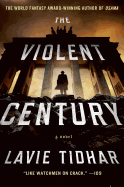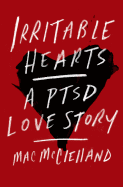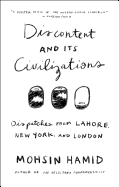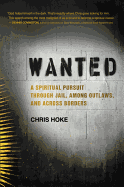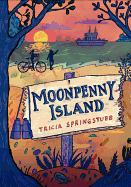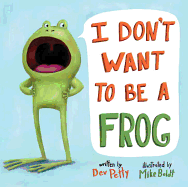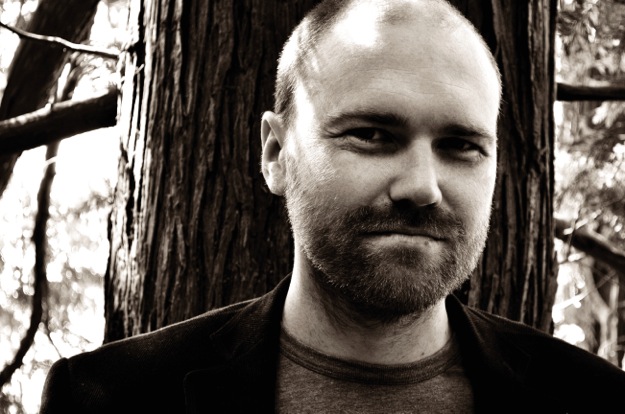 |
photo: Kristen Murphy
|
Chris Hoke a jail chaplain and pastor to gangs and violent offenders in Washington State's Skagit Valley. Through his work with the organization Tierra Nueva, he cofounded a coffee-roasting business, Underground Coffee, which employs men coming out of prison and addiction, and connects them to agricultural partners in Honduras. Hoke received a B.A. from U.C. Berkeley and an M.F.A. in creative nonfiction from Seattle Pacific University. Hoke's work has been featured on NPR and in the Sun, Sojourners and Christian Century. Wanted: A Spiritual Pursuit Through Jail, Among Outlaws, and Across Borders (HarperOne) is his first book; our review is below.
You have said that you are not a person of great faith--many people might find this a bit of a paradox since you are a prison chaplain.
I'm definitely a person of faith. But there're degrees. I wrote the line you cite in the context of a memory about a freak accident and even freakier "healing" in the jail--and how I was slow to attribute it to God's hand. Unlike many believers who speak with certainty about the mysteries of faith, I am hesitant, all too aware of how unsure I am of anything I believe. But maybe that's why I go to the jail, why I pray with folks, why I try to put Jesus's teachings into practice: so I can see, with my eyes, in my own life, witness and experience, what some people might just take on faith.
What pulled you into helping some of society's greatest outcasts find God and their own faith?
Because that's what Jesus says to do. The old Christian phrase, "following Jesus"--I guess I've taken that as literally as I can. Not as a metaphor for pious belief, but as a chasing after, imitating. Like one does with any hero. His love for the outcast is where I see that beauty, and glory, most poignantly. When I tried to "find Jesus" in following his style among one subset of today's societal outcasts--inmates, criminals, gang members--I have found others who also like Jesus's style and want to join me. I don't want to do this alone. Also, I don't think Jesus's disciples totally understood what was going on or had great faith, either. They just kept tagging along, and got pulled deeper into the mystery that eventually demanded their entire lives.
Men in prison christened you "pastor." Why was that term so difficult for you to accept at first?
Since I was pretty overchurched growing up, I observed that a pastor was the CEO of a large religious social club who constantly had to prepare sermons, look and sound right all the time, be an example for others. And that looked like a lot of pressure. And kind of lonely, at the end of the day. What changed my understanding was a bunch of young "bad guys" who embraced me, accepted me as I was, didn't pick apart my theology but saw God's presence inside me somehow. When they called me their pastor, at first I thought they were teasing my goody-goodness. But they said no, it was a good thing. "We've never had one." That broke my heart.
Plus, pastor means shepherd. Shepherds are not the ranch managers. Shepherds accompany the sheep through dark, hidden, remote places. They spend a lot of time away from mainstream civilization. The more I reflected on pastors as shepherds, I got more excited about what I was already kind of doing.
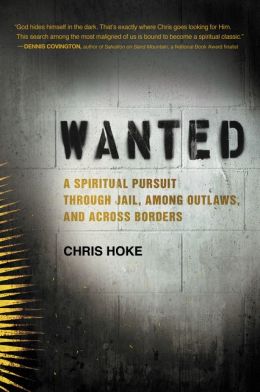 Through your experiences you learned that touch plays an invaluable part in the lives of these criminals. When it was taken from them, they became more violent.
Through your experiences you learned that touch plays an invaluable part in the lives of these criminals. When it was taken from them, they became more violent.
I can't back that up with evidence or numbers or anything--how the jail became a more violent place after the no-touch policy was implemented. It was my impression. I remembered there being a slew of fights that first month or two, more than normal. Just recently we have been in conversation with leadership at our jail about this issue. Some see eliminating touch as a security measure, but other staff have admitted that every human needs a hug, especially in tragic or stressful days of their lives. And if men locked up in a box have no one to embrace them, connect in the most basic and healthy of human ways, how do we expect them to not act out in unhealthy ways? I believe this policy is coming under question more, and hopefully good chaplains can earn the trust back to have healthy human touch with suffering inmates.
How did the loss of this contact affect you in your work and relationships with the men?
Men coming out of their cells and embracing us chaplains before a group Bible study became normal for years, as well as them gripping our hands in prayer during a one-on-one visit. It became suddenly awkward, sad, for me, to dodge their welcomes and visit individuals only through the thick glass. I still got to go home and hug my family and friends, hold hands in worship settings. So I was okay. It was just hard not to be able to share that with men who needed it more than anyone I'd see all week.
When the men are released from prison, they struggle getting jobs because of their histories. Tierra Nueva has an enterprise to try to combat this situation.
To be clear, many released men and women can and do get jobs, even with their tattoos and felony records. It's just much harder. Many give up. We started Underground Coffee not really to give employment where there was none, but rather a certain kind of employment: small, partial-time work for men who have so many court dates, recovery class requirements and personal/family healing work to do that it's not sustainable to hold a steady, full-time job. Resurrection can be a slow process, and guys need a few steps between the dark underground and full-time employment with all their financial debt burdens being paid off. We need what Michelle Alexander calls a "new underground railroad" for people getting out of today's crushing under-caste.
What is "Hugs for Thugs?"
That's just our first T-shirt, an idea my friend Neaners had when he was in solitary confinement. I think of it as spreading the most basic message, the gospel, in three words: God's response of total embrace and love for "sinners." But few people, outside of religion, say "sinners." We say things like "thugs," "hoodlums," "criminals," "f--kups." So, "hugs for thugs" is a nice summary statement. Those T-shirts are like our Girl Scout cookies--another small fund-raiser to sell locally to support our work.
And former gang members are recruited to become chaplains.
This is the most exciting part of my work with guys like Neaners and Ramon and others at Tierra Nueva, and especially the characters Shorty and Donacio I wrote about in later chapters in the book: gang leaders know how to recruit the lost. They know the pain of kids out there, from the inside out of their own gut and history. These guys have attitude, charm, style, energy, bossiness in calling bored, abandoned kids out of the streets, like Pied Pipers, to follow them. Think about it: gangs grow, they thrive, without funding, grants, paid positions and leadership conferences. They have figured out how to multiply in the cracks of society, with a kind of instinctual grassroots organizing. Yes, the activities of gangs often wreak havoc through violence, drug dealing, misogyny, etc. But if that same grassroots outreach energy can be harnessed by a greater movement, a greater love--which Jesus embodied on the roads of Galilee at the very start--then the church has a wildly exciting future.
When you speak at churches and other venues, do you find openness or are you met with resistance?
Thankfully, most of the churches that invite me or fellow staff or homies to speak are very receptive. Most people simply have no connection to, or awareness of, the jail and prison worlds. When people hear not just a litany of the system's evils, but hear old scriptures read alongside real faces and hear stories of these tattooed guys--and these guys actually speaking in their pulpits, with timidness and tenderness and sometimes tears--well, then, hearts open. Both the guys' hearts and the hearts of those in the pews listening.
One of the individuals in Wanted is Richard Mejia, who has been in the news because the prison was sued for his death. Have any valuable changes come from the lawsuit?
Last year I attended, along with Richard's loved ones and lawyers, the hearing for the medical staff responsible for Richard's easily preventable death in prison. The hearing was a joke. The medical professional with a documented history of complaints from fellow staff smugly described the only area for self-improvement he found in his season of required self-examination: that he needs to speak less publicly, at work, about how proud he is of his successful children. The panel of other doctors all thanked him for his patience and good work and went home. He ended up getting promoted, with a raise. We watched how the system worked that day. Richard's mistake led to the death of an elderly woman, and he was punished for that, rotting to death in prison at age 26. The prison staff responsible for his death got a promotion and a raise. This is what it means to be thrown away, not a citizen or human being in America.
The book is written in a series of what you describe as "Wanted posters." Are there more posters to share?
Yes, I am developing ideas for two more books. One is about my ongoing relationship with another main character in Wanted, Neaners, and about alternative family, tentatively titled Thicker Than Blood. I am also sketching out a possible novel about meth dealers, naval bases, old hippies in the Northwest, Aztec sacrifice and blackberry wine! --Jen Forbus of Jen's Book Thoughts
Chris Hoke: Building a New Underground Railroad
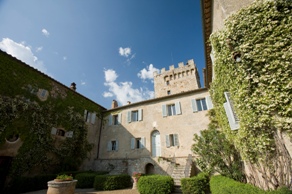




 Through your experiences you learned that touch plays an invaluable part in the lives of these criminals. When it was taken from them, they became more violent.
Through your experiences you learned that touch plays an invaluable part in the lives of these criminals. When it was taken from them, they became more violent. 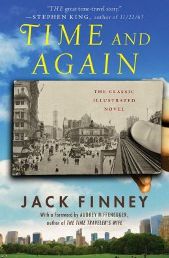 In Time and Again by Jack Finney, first published in 1970, advertising artist Simon Morley joins a covert government operation exploring time travel--and soon steps from the 20th century into New York City in January 1882. Besides wanting to see another era, Morley hopes to uncover the mystery of partly burned letter from the period that a friend has. Morley finds more than he could imagine, falls in love and must decide whether to stay in the past or return to his previous life. A bestseller when it appeared, the book was acclaimed both for its evocation of 19th-century New York City and the romance at its core.
In Time and Again by Jack Finney, first published in 1970, advertising artist Simon Morley joins a covert government operation exploring time travel--and soon steps from the 20th century into New York City in January 1882. Besides wanting to see another era, Morley hopes to uncover the mystery of partly burned letter from the period that a friend has. Morley finds more than he could imagine, falls in love and must decide whether to stay in the past or return to his previous life. A bestseller when it appeared, the book was acclaimed both for its evocation of 19th-century New York City and the romance at its core.



